As part of its mission to support research, the Foundation wishes to assist researchers, not only by awarding grants, but also by providing them with tools and resources on safety and ethics, useful for carrying out their work.
Safety recommendations for researchers in complex, isolated or dangerous terrain
In 2018, the Foundation published the French version of a guide to safety recommendations for research in difficult terrain, which researchers can freely consult and download on this page.
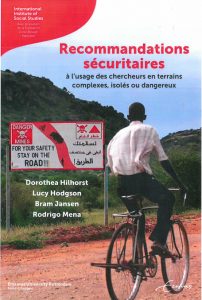
This manual is the French version of the security manual for researchers, published by the International Institute of Social Studies (ISS) of Erasmus University Rotterdam.
Due to the wide variety and complexity of security situations, as well as its commitment not to give up on hard-to-study areas, the French Red Cross Foundation has committed to translate these recommendations intended to best support researchers during their fieldwork.
The manual is available in its English original version as well as in Arabic translation on the International Humanitarian Studies Association (IHSA) website.
Ethical risk recommendations for researchers
All research projects submitted to the Foundation must be accompanied by a standard self-assessment form for ethical risks, completed by the applicant.
On the basis of their assessment of this self-assessment and of the research project as a whole, the Foundation’s evaluators decide whether or not it is necessary to submit the research project to an ethics committee.
If they decide in favor of such an approach, the Foundation’s Board of Directors awards the research grant subject to the winner’s obtaining a favorable opinion from an ethics committee. The research and payment of the grant do not begin until this favorable opinion has been obtained.
Should the evaluators not conclude that the research project needs to be submitted to an ethics committee, the research and payment of the grant may begin on the date indicated in the call for applications. However, the Foundation strongly encourages the laureate to submit his or her project to an ethics committee, and he or she must report to the Foundation on the outcome of this process in his or her 1st progress report.
Whatever the outcome of their self-assessment of ethical risks and the opinion of the evaluators on their research project, the prize-winner undertakes, in the research agreement they sign with the Foundation, to comply with the laws and regulations in force in the country or countries where the research is to be carried out, particularly with regard to entering and leaving the country, and with all regulations relating to the conduct of a research project (opinion of an ethics committee, administrative authorization, etc.).
Ethics committees have become increasingly important in the French research landscape, as well as internationally. The French Red Cross Foundation, keen to protect its researchers from the ethical risks incurred during their research, provides a number of reference documents. This compilation of documents written for researchers will help you identify and mitigate the ethical risks involved in your research project. The purpose of the charters and the MOOC is to ensure upstream that studies will not harm the people taking part in them.
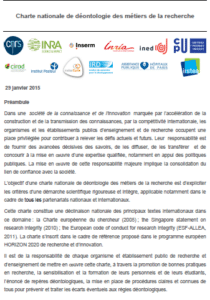
National charter of ethics for the research profession
Validated by the research commission on May 13, 2015, the national charter of ethics for research professions helps to spell out the criteria for a rigorous and honest scientific approach, applicable in particular within the framework of all national and international partnerships.
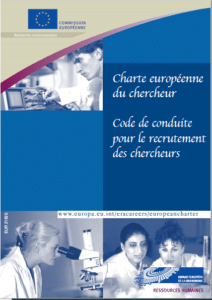
European charter for researchers
Drafted by the European Commission, the european researcher’s charter is a set of general principles and basic conditions specifying the roles, responsibilities and prerogatives of researchers and their employers and/or funders.
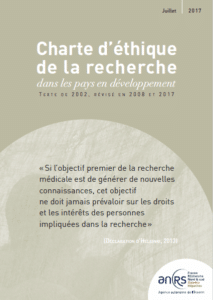
Charter of ethics for research in developing countries
Published by the Agence Nationale de Recherches sur le SIDA (ANRS), this code of ethics defines the rights and duties of researchers and research institutions in developing countries.
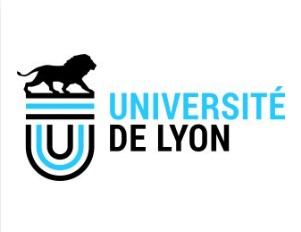
MOOC: research ethics
The FUN MOOC proposed by the University of Lyon, focusing on research ethics, is aimed primarily at thesis students, but is of interest to all researchers and citizens wishing to reflect on the transformations and contemporary implications of research, and the new ethical issues they raise.

